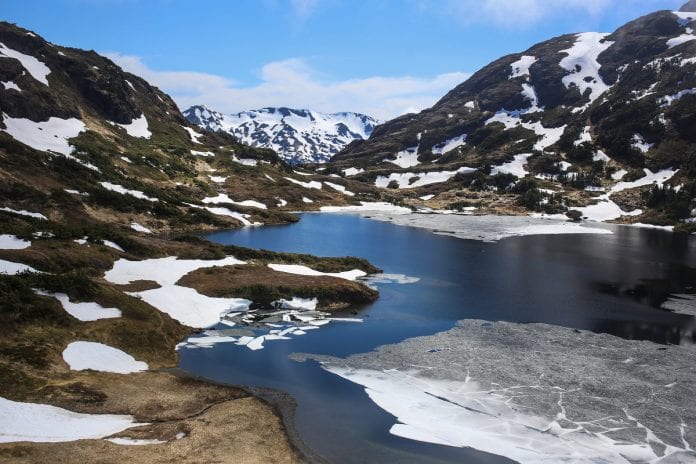Cordova Electric Cooperative has concluded the geotechnical work needed to assess the feasibility of the Crater Lake Water and Power project site, including the quality of rock at the site and along the length of the pipeline.
In addition to providing eight percent of Cordova’s total energy, the project could create educational, recreation and safety improvements, and more energy storage.
“Because the energy is stored for use when needed, it is a very strong complement to solar, wind, tidal, current, and other energy technologies, which can be used when they are available, with Crater Lake as the backup when they are not,” said Clay Koplin, chief executive officer of the cooperative. “Crater Lake may not take us to fully renewable but it certainly opens the path to get there.”
CEC’s Crater Lake Water and Power Project began in 2013 as a way to expand Cordova’s water supply. The plan itself dates back to 1960, when the Cordova Public Utilities first drew up plans.
The original project driver was the need for a clean, adequate community water supply, particularly in the winter. This would meet the community’s current needs and also provide future growth and potential for winter seafood processing, water for export markets, water to support the local beverage industry and potable water to provide a regional emergency supply in the event of a large disaster, Koplin said.
“It gives us enough stored water and energy to get the community through an entire winter if need be,” he said.
During the May 16 city council meeting, a request from CEC to have council contribute $100,000 towards the geotechnical assessment was referred to staff.
By September, CEC had still not received an answer, but was able to move forward with the assessment, due to partner funding.
“CEC proceeded with the work because we got $100,000 of assistance from the Department of Energy and because the drilling crew was being brought to Cordova to do the work for the Shepard Point Road project,” Koplin said. “That offered substantial savings, probably $150,000 or better, so it just put it within reach.”
The draft report from the geotechnical assessment has not been provided yet, but the CEC expects to have it after the first of the year.
After receiving the draft report, CEC, the city of Cordova staff and council will then consider the information, costs and benefits, and decide whether or not to proceed with the design aspect of the project, Koplin said.
“If we proceed with design phase, I would anticipate it to commence in less than 12 months,” he said.
Koplin also hopes to dispel ideas that upon completion, electric bills will dramatically decrease. “It’s going to stabilize rates,” he said.
According to Koplin, the Orca Water Plant delivers between 150 and 200 million gallons of water per year, about one third of the community’s water.
By installing a dam, there would be as much as 500 million gallons of stored water capacity, a number fairly close to what the community uses in one year.
Dams have an average lifespan of 100 years or more.
“We recognize that when you store water there is risk and we want to know what that risk is, particularly when we have concerned land owners there in the path,” Koplin said.
Ice dams naturally form at Crater Lake and every 20 to 30 years will break and flood the ground below, he said.
“I have always felt and still feel that a concrete dam … will actually improve the safety of the site,” he said. “A failure may be a bigger event, but you reduce the likelihood of that failure so much that overall it’s a reduction in risk.”
Recently, education opportunities have already begun at the site.
Cordova’s seventh and eighth grade science classes took a field trip this fall to the site to view rock samples, learn how to measure hydrology and spoke with CEC’s on-site geologist.
Koplin reiterated his concern for transparency and sensitivity to community input and wishes and urged concerned citizens to talk with him for more information.
“Our goal is to have 100 percent support for the project,” he said.















